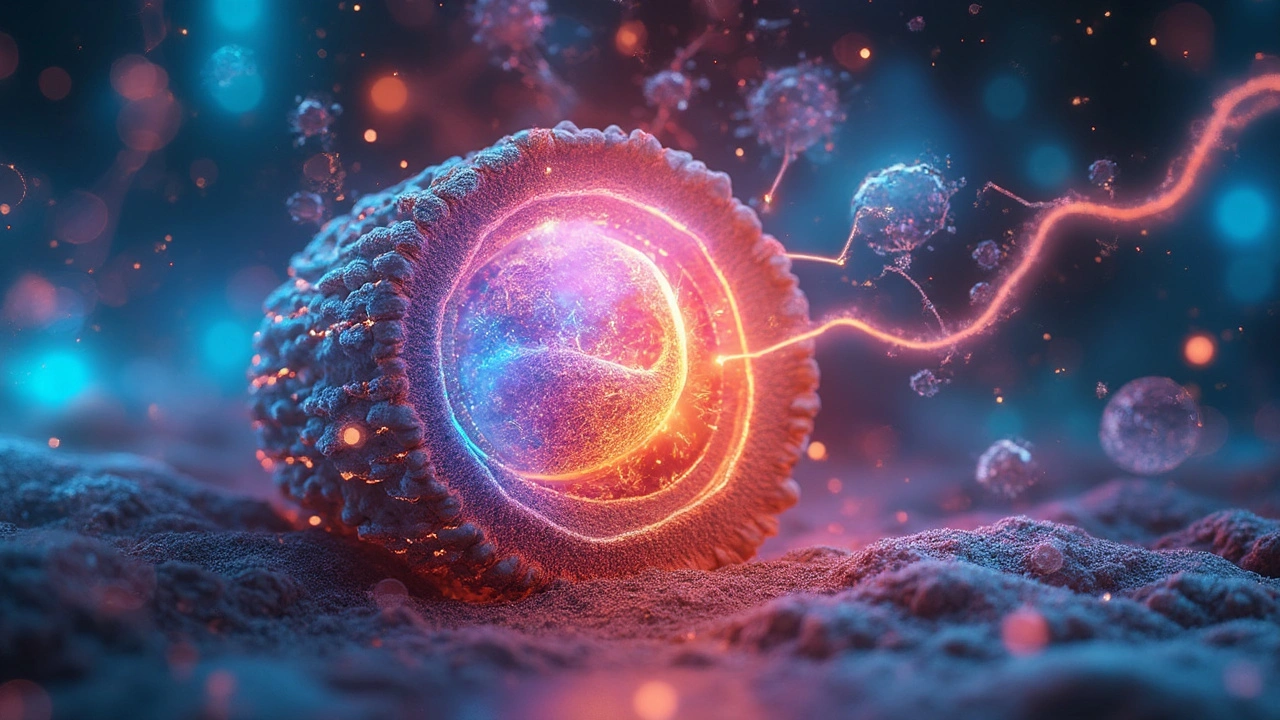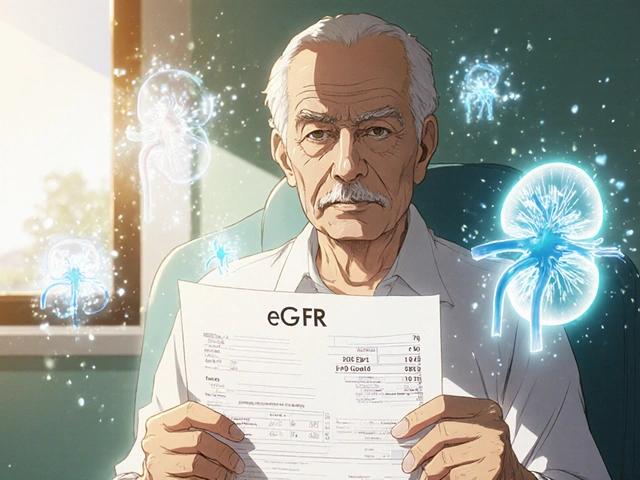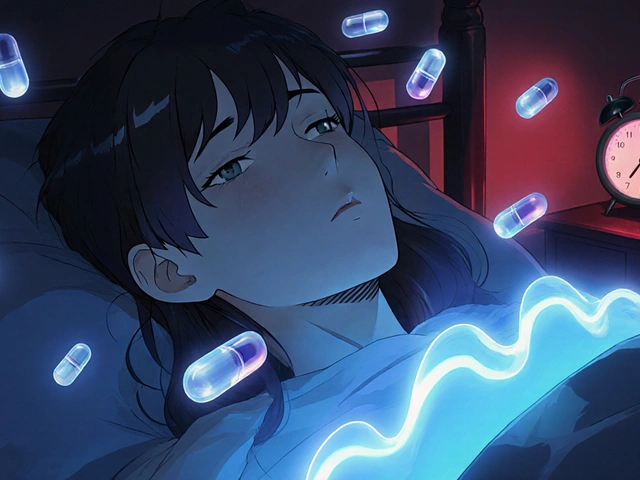Ever wondered why some folks have freckles while others don't? It all comes down to melanin, the stuff that gives our skin its color. If you've got freckles, they're probably most noticeable after you've been out in the sun. But there's more to freckles than just sunbathing.
Freckles aren't just a simple cosmetic quirk; they're a fascinating puzzle piece in the bigger picture of skin pigmentation. They can be clues to how your skin might react to the sun or even hint at your genetic makeup.
Now, the interesting bit—freckles might share some common ground with other pigmentation disorders, like melasma or even vitiligo. Not that having freckles means you're bound to develop these conditions, but they all circle back to how your skin produces and deals with melanin.
- Freckles 101: All About Those Spots
- The Genetics Behind Freckles
- Freckles and Sun Exposure: The Good, Bad, and Ugly
- Connecting the Dots: Freckles and Other Pigmentation Conditions
- Practical Tips for Managing Freckles and Pigmentation
Freckles 101: All About Those Spots
So, what exactly are freckles? These small, flat, brownish spots mainly pop up on skin that's been exposed to the sun. They're more common in people with lighter skin, but anyone can have them. The science behind freckles is both simple and cool: they're caused by clusters of extra pigment, known as melanin, which is our body's natural sun protector.
Freckles usually appear during childhood and might increase in number until you're in your 20s. And if you've noticed that your freckles seem to fade in the winter and come back every summer, you're not imagining things. This is pretty normal, thanks to our good friend, the sun.
The Role of Genetics
Believe it or not, whether or not you have freckles is mostly written in your DNA. Research has shown that a mutation in the MC1R gene is often behind those signature specks. This gene is also linked to red hair, which is why people with red hair are more likely to have freckles. But don't worry if you're a freckled brunette—genetics can be unpredictable!
Freckles vs. Sunspots
It's easy to mix up freckles with sunspots. While both are sun-related, they differ significantly. Sunspots, or solar lentigines, are larger and more irregular, appearing later in life, whereas freckles are tiny and uniform, showing up early. Knowing the difference can help you make smart skin care choices.
Fun Freckle Facts
- Freckles are completely harmless and don't require any medical treatment.
- They're a great indicator of how sensitive you might be to the sun. More freckles usually mean you need to be extra careful with sun protection.
- Some folks even use freckles as a trend, with temporary freckle tattoos or makeup gaining popularity.
So, there you have it — a little peek into the world of freckles. They might seem simple, but there's a lot more to know about these spots. And if you're one of the freckled ones, wear them with pride!
The Genetics Behind Freckles
Diving into the world of freckles starts with understanding the role of genetics in their formation. So, how do genes tangle up with those charming little spots?
Essentially, if you've got freckles, you can blame—or thank—your family tree. Freckles are affected by the MC1R gene, which is responsible for producing a type of melanin called pheomelanin. This type of melanin doesn’t do much for blocking UV rays, which is why folks with freckles often end up with more of them after sun exposure. Now here’s the twist: even if you inherit this gene, it doesn’t automatically mean you'll be dotted with freckles. It all depends on other genetic factors and, of course, how much sunlight you catch.
Pigmentation disorders, like freckles, often run in families—not because your ancestors had sunlit picnics, but because of this little gene dance. Pretty fascinating, huh?
Red Hair and Freckles — What’s the Deal?
There's a classic duo everyone knows: red hair and freckles. Both are linked to the same MC1R gene. This is why you'll sometimes see that people with red hair often sport plenty of freckles. It's not a hard rule, though—nature loves to surprise us with its knack for variety.
The Fun Fusion of Somewhere Between
Interestingly, not everyone's freckles are the same. Some people might develop them only on their faces, while others might have a sprinkling across their shoulders. This uneven distribution is influenced by genetic expression and environmental factors, like how much time you spend outdoors.
If you're into numbers and facts, here's something cool:
| Factor | Chance of Having Freckles |
|---|---|
| Family History | 50% if one parent has them |
| Red Hair | 80% likely to have freckles |
| Sun Exposure | Increased chance with UV exposure |

Freckles and Sun Exposure: The Good, Bad, and Ugly
Step into the sun, and if you're predisposed, you might notice your freckles popping up like little brown flecks. But what's really happening? It's all about melanin. Sunlight triggers your skin to produce more melanin, and if you have a particular gene, that means more freckles.
The Good: Natural Sun Kiss
Let's start on a positive note. A sprinkle of freckles can definitely give that sun-kissed, youthful appearance many admire. For those who love their freckles, sunnier days can boost their visibility, offering a unique charm without needing expensive beauty products.
The Bad: Skin Damage Woes
Unfortunately, it's not all sunshine and roses. While a few extra freckles can be cute, too much sun can lead to other unwanted pigmentation issues, and that's not counting the risk of sunburns. Prolonged UV exposure can eventually cause damage that alters the structure and behavior of your skin cells over time.
The Ugly: Long-Term Risks
Remember, excessive sun exposure can mean more than a few additional spots. It can potentially escalate the risk of skin cancer, including melanoma, and lead to other yadda-yadda troubles like accelerated aging—think wrinkles and loss of skin elasticity.
What's smart? Being sun-smart! Consider these tips:
- Apply broad-spectrum sunscreen with an SPF of at least 30 before heading out.
- Wear protective clothing, like hats and sunglasses, to shield your skin from direct sun.
- Reapply sunscreen every couple of hours, especially if you're swimming or sweating.
Take care of your skin, and it will take care of you. Enjoy the sun responsibly, and your freckles can stay the delightful highlights they are without bringing along unwanted guests.
Connecting the Dots: Freckles and Other Pigmentation Conditions
The story of freckles isn't just about cute spots dotting your nose. They have a deeper connection with other pigmentation disorders. Understanding this can offer insights into your skin's health and its unique characteristics.
The Role of Melanin
Melanin, a natural pigment, plays a pivotal role in determining skin color. It's also behind the formation of freckles. When you're exposed to the sun, your skin produces more melanin to protect itself, and that's when freckles start to stand out. But melanin is also linked to other conditions like melasma, which causes large patches, and vitiligo, where pigment is lost in certain areas.
Genetic Connections
Ever heard about the MC1R gene? It's often called the 'freckle gene' because it controls pigmentation. Variants in this gene can increase the likelihood of not just developing freckles but other pigmentation issues too. While having freckles doesn't mean you'll automatically have these conditions, they share some of the same genetic pathways.
Common Triggers
Sunlight is a known trigger for freckles, but it can also worsen melasma. It's the ultraviolet (UV) rays that spur melanin production. On the flip side, vitiligo’s loss of pigment isn’t directly caused by the sun, but the contrast can become more visible with sun exposure. So, protecting your skin is crucial no matter your pigmentation situation.
Practical Advice
- Regularly use a broad-spectrum sunscreen to shield against UV rays. SPF 30 or higher is a good bet.
- Consult with a dermatologist if you notice changes or have concerns about your skin.
- Keep an eye on any changes in the pattern or size of your freckles; it can be a handy way to monitor your skin's overall health.
Freckles are more than just spots; they're a glimpse into our skin's intricate dance with the sun, genetics, and the environment. And while they share space with other conditions, understanding them can help you take better care of your skin.

Practical Tips for Managing Freckles and Pigmentation
Got freckles or other pigmentation disorders? No worries, you're not alone. A lot of folks out there are figuring out how to keep those spots in check while maintaining healthy skin. Let's dive into some easy and practical tips that you can actually use.
Stay Sun-Smart
The sun's rays can make freckles more prominent, so protecting your skin from sun exposure is a biggie. Slather on sunscreen every day, even when it's cloudy. Look for broad-spectrum protection with an SPF of at least 30.
- Reapply every two hours if you're outside for long stretches.
- Wear a wide-brimmed hat and UV-blocking sunglasses when you're soaking up rays.
- Seek shade whenever possible, especially during peak sun hours from 10 AM to 4 PM.
Skin Care Regimen
With freckles or other pigmentation challenges, the right skincare routine is key. Consider using products that promote even skin tone.
- Gentle exfoliants, like those containing alpha hydroxy acids, can help to remove dead skin cells and allow fresh skin to shine through.
- Use moisturizers with antioxidants, like vitamin C, which help protect your skin from environmental damage.
Professional Treatments
If you find that home care isn't making the cut, it might be time to chat with a dermatologist about professional options. Here are a few you might consider:
- Laser therapy sessions can target freckles without damaging surrounding areas.
- Chemical peels can work wonders by exfoliating the skin and reducing discoloration.
- Prescription creams often contain ingredients like hydroquinone that help fade darker spots.
Home Remedies
If you're more into natural solutions, there are some home remedies folks swear by, like lemon juice or honey. But these should be used with care, and it's always good to test on a small skin patch first to make sure there are no adverse reactions.
Stay Informed
When managing skin pigmentation, knowledge is power. Keep up with the latest on skincare products and treatments, and always consult a professional when making decisions about your skin.









Comments (10)
Benton Myers
July 17, 2025 AT 00:16 AMInteresting article! I've always thought freckles were just harmless marks from the sun, but this piece adds some intriguing layers about genetics and other pigmentation disorders.
It's fascinating how something so simple as freckles can be connected to complex conditions like vitiligo or melasma. I wonder if the skincare tips mentioned are truly effective for people suffering from these pigmentation issues?
Skin health is such a complex topic, especially when you factor in genetics alongside environmental exposure. I appreciate the straightforward breakdown in the article, it’s a good starting point for anyone curious.
Matt Tait
July 19, 2025 AT 06:40 AMHonestly, it's all a bit overrated. Freckles? Sun spots? Melasma? People obsess over these things way too much and then blame the sun or genes when they’re just not taking care of themselves properly.
If you want healthy skin, use sunscreen and stop whining about your spots. Genetics might play a role, sure, but putting all the blame there is lazy.
This article makes it sound like freckles are some big mystery when in reality they’re just a natural response to sun exposure. No secret conspiracy, no hidden health crisis.
Anyone else tired of reading these overhyped takes on simple skin stuff?
Pat Mills
July 20, 2025 AT 10:26 AMWell, well, aren’t we all just fumbling blindly through the murky depths of dermatological enigmas? Freckles, those charming little constellations scattered across the skin, are more than mere cosmetic quirks—they are the silent heralds of a deeper genetic saga beneath our epidermis.
This piece lays bare the tangled web between pigmentation disorders and genetics in such a dramatic way that anyone who’s ever gazed curiously at their own freckles would be compelled to reconsider their triviality.
I must say, the insightful breakdown of melasma’s relationship with sunlight, intertwined with the mysterious case of vitiligo, paints a compelling narrative for us all to embrace the complexity of our skin’s story.
Eric Sevigny
July 21, 2025 AT 14:13 PMFrom a dermatological standpoint, the article does a fair job of introducing freckles and their links to broader pigmentation disorders, but it definitely scratches only the surface.
It’s important to stress that freckles themselves are benign, and their presence or prominence can vary widely between individuals depending on multiple factors including skin type and genetic predisposition.
In clinical practice, we advise careful monitoring of any pigmented spots for changes, as some pigmentation changes can signal underlying conditions, but freckles are generally not a concern.
The skincare tips offered are practical, especially emphasizing sun protection, which cannot be overstated. However, personalized approaches should be sought for those with melasma or vitiligo.
Dawn Mich
July 22, 2025 AT 18:00 PMHonestly, I can’t help but wonder if there’s some bigger conspiracy about what causes these pigmentation problems. Like, who’s really benefiting from making freckles and pigmentation disorders seem like just environmental or random genetic outcomes?
Maybe there’re powerful companies pushing skincare products by playing on people’s insecurities by exaggerating the health risks linked with freckles and pigmentation disorders.
And why do we never hear about the long-term impacts of the chemicals used in so many skin treatments? It’s all a bit fishy, if you ask me.
Glenda Rosa
July 23, 2025 AT 21:46 PMOh great, another glorification of freckles and their supposed 'genetic significance.' Let me burst that bubbly theory: freckles are just melanin behaving erratically, no deep cosmic connection or hidden secrets.
Melasma and vitiligo are completely different beasts, and lumping them together with freckles under some vague pigmentation umbrella smacks of laziness in explanation.
Would have loved to see some real science, but nah, just glorified sun spots with a side of genetics drama.
charlise webster
July 25, 2025 AT 01:33 AMJust want to jump in here and say that the correlation between freckles and other pigmentation disorders isn’t as linear as some articles make it out to be.
I’ve read multiple dermatological studies showing freckles are benign and largely cosmetic, while conditions like melasma or vitiligo have very different pathogenic mechanisms.
One shouldn’t conflate these just because they share pigmentation themes. It’s more nuanced, and oversimplifications don’t help anyone understand or manage their skin better.
Mark Eddinger
July 26, 2025 AT 05:20 AMAs someone who focuses heavily on clarity and accuracy, I must note that the article provides a decent introductory glimpse into the world of pigmentation disorders linked to freckles. However, it’s imperative to approach this complex topic with care and not generalize too broadly.
For instance, the genetic mechanisms underlying vitiligo are immune-related and quite distinct from the melanin-focused processes involved in freckles and melasma.
I appreciate the article’s emphasis on practical skincare advice; it’s crucial for readers to adopt sun protection and consult dermatologists for personalized treatment.
Francisco Garcia
July 27, 2025 AT 09:06 AMThis article made me think a lot about how cultural perceptions of spots and freckles vary around the world. Some cultures celebrate freckles, while others seek to eliminate any pigmentation marks.
I appreciate that the article touches on genetics because that’s often overlooked in favor of just blaming sun exposure, which isn’t the whole story.
Has anyone here had experience dealing with pigmentation disorders beyond just freckles? I’d be curious to hear what treatments or routines worked best for you.
Sharing real-life insights can really help make these scientific topics relatable.
lata Kide
July 28, 2025 AT 12:53 PMOh my goodness, this topic hits home for me! Freckles have always felt like tiny little windows showing the drama of sun and genes battling it out on my skin, and this article just magnifies that emotional landscape.
For anyone struggling with pigmentation, you know it’s not just about looking different—it’s about feeling confident in your own epidermal canvas. 🌞✨
Sometimes, the advice neglects how emotionally charged these skin differences can be. I’m curious: do you think the article captured that side, or was it all just a clinical rundown?
Emoji hugs to everyone out there embracing their unique spots and shades! 💖🌈